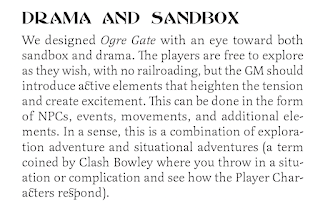A core element of Wandering Heroes of Ogre Gate is the Grudge Table. This tool helps the GM keep track of ongoing feuds with NPCs and sects, ensuring that their enemies occasionally come to settle the grudge. You roll on it regularly and it can also be triggered by a standard encounter table. It is one of the things I found most useful for bringing the wuxia genre to life in a way that feels natural. I want to go over how the grudge table can be modified to add in other complications, in particular dramatic complications.
Ogre Gate is described as Drama and Sandbox is the core rulebook. Here is a brief excerpt from the GM section:
The basic idea is to introduce dramatic twists and turns, appropriate to the genre while respecting the players freedom to explore. I primarily work through NPCs when doing this. I find it easier to manage the motives and goals of my NPCs, and see what events those lead to, than orchestrating set pieces (that is just my personal approach, not a statement against using said set pieces in an Ogre Gate campaign). Something like set pieces still emerge, but when they do arise it is because an NPC is trying to orchestrate something grand and succeeds. Again though, this approach is simply a matter of taste and preference.Deciding when and how to introduce drama can be a challenge. I usually go by a combination of what seems appropriate, what coincidences and events seem like they are naturally pushing things in that direction and as a response to actions players take. But another method is to rely on the Grudge Tables.
In the Sons of Lady 87 Campaign book, I describe a modified grudge Table that includes 'lingering complications' which specifically has criminal characters in mind. So a lingering complication may be officials tracking them down over a bank heist. Here is an example of the table:
For my current Celestial Plume Masters campaign I am experimenting by swapping out Lingering Complication with each of the dramatic relationships the characters established in our first session. I am also rolling on the Grudge Table once at the start of every session. With the dramatic relationships, it looks like this:
It works like a normal Grudge Table. I roll before the session begins and if something comes up, it will appear sometime during the session when it makes sense. If the result is 2-6 (which are established Grudges) then it is likely to be combat, an ambush, or some other hostile exchange. But if it is 17-19*, then the NPC result is someone they have a more dramatic relationship with, likely someone who wants something from them, and someone they want something from. And because it is a complication, I think it's fair to introduce the encounter at either a moment of inconvenience or in a way that further complicates an existing situation.*If they gain another dramatic complication then it would be 16-19






No comments:
Post a Comment